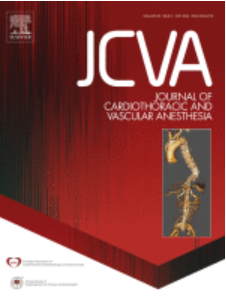Two UNC Anesthesiology clinical faculty researchers are helping advance evidence-based knowledge on the merits of integrating artificial intelligence (A.I.) into point-of-care ultrasonography (POCUS) as a precision tool for clinicians. In the January 2024 issue of Journal of Cardiothoracic and Vascular Anesthesia (JCVA), Associate Professor of Anesthesiology Ricardo A. Serrano MD, FASA, and Associate Professor of Anesthesiology and Director of Perioperative Echocardiography Alan M. Smeltz MD, FASE, co-authored a literature review entitled, “The Promise of Artificial Intelligence-Assisted Point-of-Care Ultrasonography in Perioperative Care.” The review outlines how A.I.-assisted POCUS has improved perioperative practice and workflow through optimizing diagnostic accuracy and providing real-time anatomic evaluations across a range of under- and highly resourced point-of-care settings.
In their review, Drs. Serrano and Smeltz overview how A.I. has become both an integral and invaluable part of the rapid expansion of POCUS in perioperative settings. The co-authors note how artificial intelligence has revolutionized POCUS, enabling clinicians to optimize images, identify anomalies, perform automated measurements and calculations, and facilitate diagnoses more efficiently wherever a patient is being treated. Drs. Serrano and Smeltz conclude that A.I.-assisted POCUS is likely to become increasingly commonplace within anesthesia care point-of-care practice as a proven perioperative tool enabling clinicians to move expeditiously, yet comprehensively through large case volumes. The co-authors note, however, that A.I. application to POCUS can present dataset bias, privacy and transparency concerns, inhibit decision-making processes and create other ethical considerations in patient-centered practice.
Dr. Serrano is a POCUS expert who has long incorporated this invaluable point-of-care tool in practice. He advocates using the superior capacities in detection, measurement and calculation of A.I.-integrated POCUS to enhance patient management and outcomes in perioperative settings.
Dr. Serrano noted: “Our article is a review that aims to inform readers about this emerging technology. Although it was not a research study, it provides valuable insights into the potential benefits of A.I.-powered POCUS machines. Although we are not currently using this technology in the Department of Anesthesiology, we believe that A.I.-assisted POCUS will continue to improve over time. Moreover, we expect that more companies will continue to add more A.I. features to POCUS machines in the near future.”
Dr. Smeltz is a peri-operative echocardiography expert who has witnessed the revolutionary impact of A.I.-assisted POCUS on cardiac ultrasonography. Among other cardiothoracic anesthesiologists, Dr. Smeltz has used A.I. to expedite real-time evaluation of cardiovascular and respiratory abnormalities, assist in verifying rhythm classification, detect residual cardiac activity, and narrow the differential diagnoses for reversible causes of cardiac arrest. Used in cardiac ultrasonography, A.I. enables anesthesiologists like Dr. Smeltz to additionally assess automated chamber quantification for differential diagnoses of diseases such as hypertrophic cardiomyopathy and constrictive pericarditis.
Dr. Smeltz noted: “Though machine (deep) learning facilitates rapid, accurate, and reproducible metrics of cardiac function, using A.I. application to recognize and categorize standard echocardiography views with expert-level quality is already a feature of state-of-the-art echocardiography machines used at UNC Health in cardiac ultrasonography.”


